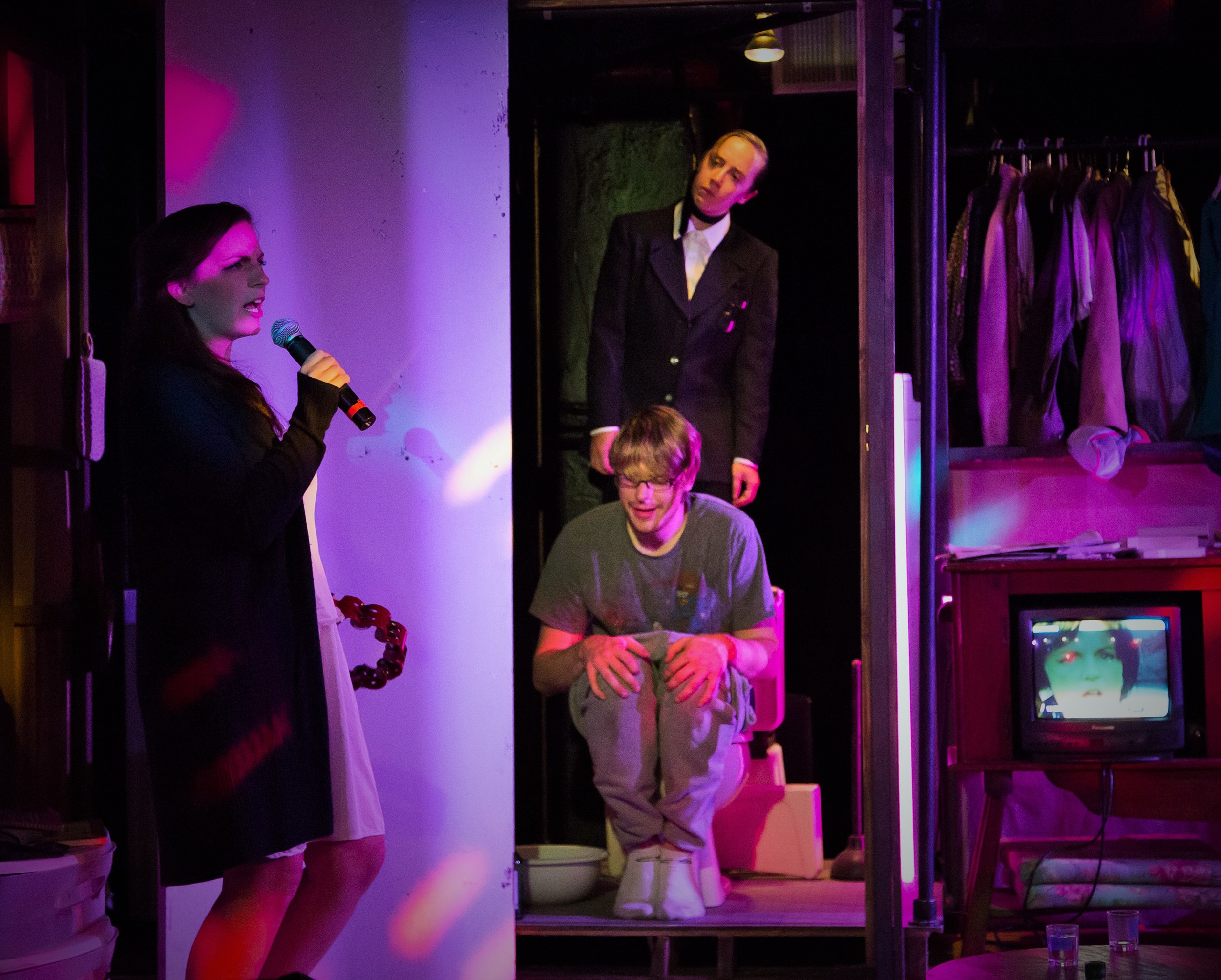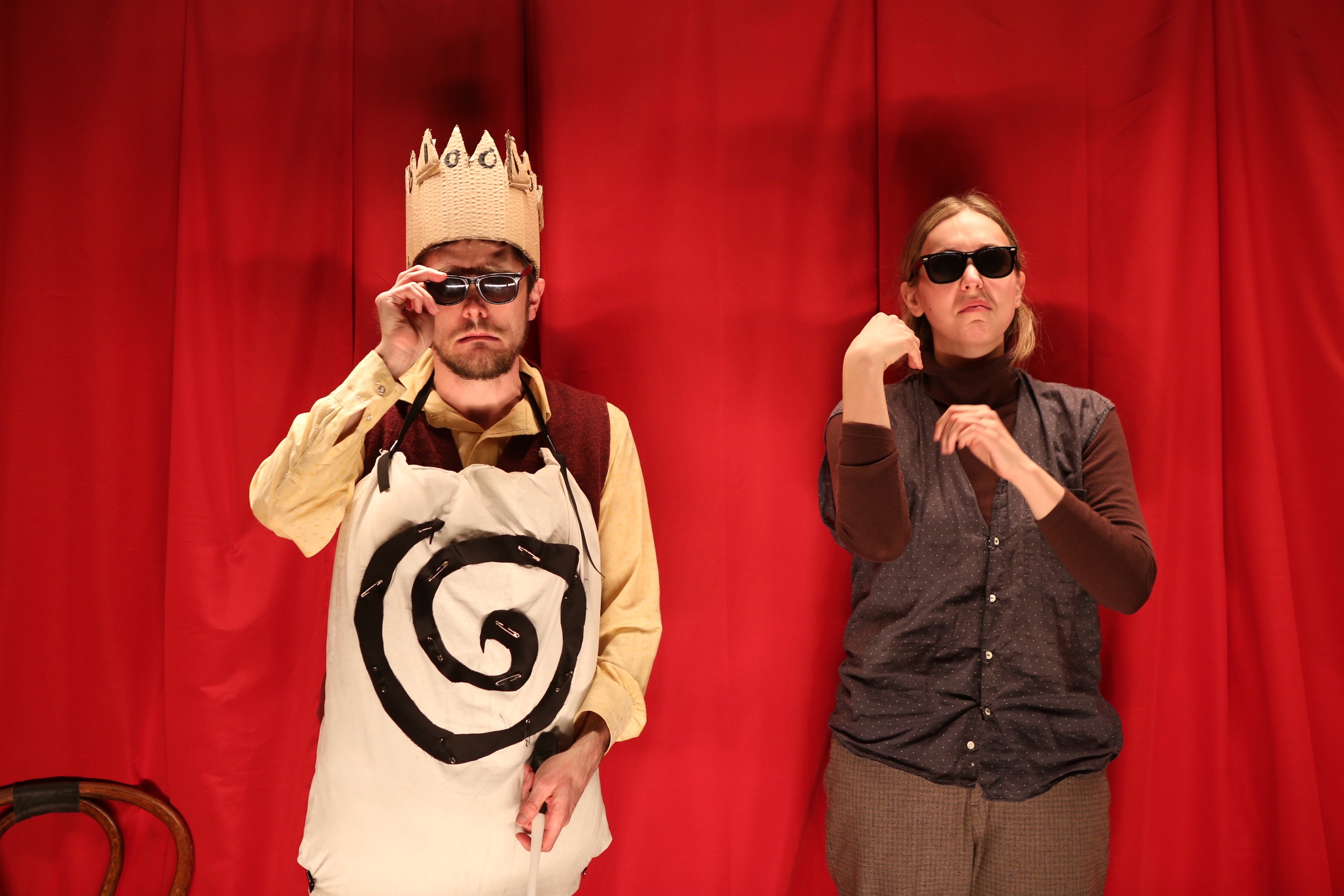Review of Don't Be Too Surprised, Yale Cabaret This weekend the Yale Cabaret is dark. Last weekend, Cab 2 offered Don’t Be Too Surprised by Korean actor and playwright Geun-Hyung Park, translated and directed by Kee-Youn Nahm, a YSD dramaturg. As a production, the show was indicative of the ad hoc approach the Cab often boasts, as none of the performers in the play were actually actors and two were non-YSD students. A chance to work outside discipline is one of the attractions of the Cab for YSD students and others, so we shouldn’t be too surprised.
The show’s menu featured the names of all dishes in both English and Korean and that gave immediate indication of the kind of hybridity the play sported. Finding a Korean equivalent for “lemon madeleines” might be as interesting as finding English equivalents for the dynamics of Park’s offbeat play, as filtered through Nahm’s translation. At times we might wonder how what we’re seeing would sound and feel in its native language, where the odd family dynamic featured in the play might be embraced as obvious satire or maybe even as tragi-comic melodrama. The playbill statement from the Artistic Directors and Managing Director asserts that “this production tackles a cultural translation—one that offers a fresh perspective on the absurdity of our everyday.”
Indeed, the humor of absurd theater keeps the play unpredictable and enigmatic, where Father (Helen Jaksch) seems to be in low-key mourning for a colleague who recently committed suicide and then, to the surprise (though not too much) of his Second Son (David Clauson), hangs himself in the bathroom. That might not seem the least bit amusing but for the fact that he continues to hang in plain view of the audience every time the door to the bathroom is open—as it frequently is due to Second Son’s constipated but determined attempts to void his bowels. Clauson crouched on the commode grunting beneath his dead father’s more or less sympathetic eye becomes a regular “gag,” if you will—one that might have, depending on how you view such things, considerable symbolic meaning for anything from customs of potty-training to customs of burial and commemoration. Or it might just be a protracted bathroom joke.
The other members of this dysfunctional family include First Son, played by David E. Bruin as a self-involved filmmaker who barely notes in passing late in the play that his wife (Caitlin S. Griffin) gave their child up for adoption. The child, as his wife reveals, also in passing, had a blood type that indicated the child could not have been her husband’s. Other shenanigans: in addition to Second Son’s constipation he is also unwilling or unable to leave the house; the wife seems to occupy the role of waitress/exotic dancer/escort at a local bar, a position she says her husband urged her to take. And why not, her fees for her services there—including bringing home a client (Justin Meadows)—seem to be the household’s only real income.
The latter might seem a minor point, but as the play goes on the “absurdity” of its situation seems to teeter more to a kind of “toilet seat realism” where the throes of this family hitting rock bottom is buoyed only by their rather odd and amusing detachment from what they’re going through. A situation which might seem potent with plenty of O’Neill-like psychic misery and verbal breast-beating is instead delivered with a zest only a few notches lower than a sit-com. We could even say that its sit-com nature predominates when—as occurs several times—characters enact karaoke routines that appear, sometimes, on their living room console (in Ni Wen’s colorful projections) and also on flatscreens strategically placed in the theater. Griffin in particular does a great job of presenting the at-times brutally direct speech of the play with engagingly forthright delivery. Similarly, Meadows as the rather nonplussed “gentleman caller” in one little scenario is hilariously off-hand when meeting his escort’s husband, brother, and the corpse of her father-in-law. In perfect he-handyman fashion, he offers to fix the fan in the bathroom to help with the stench.
In the midst of all this are moments, gestures, speeches that may cause us to contemplate the precariousness of family relations, the difficult accommodations that any of us might have to make with our place and time, and even fable-like tales of an octopus and a crab, as well as talismanic memories—for Second Son, of his mother—that create a kind of post-Freudian (in the West anyway) fabric of potential symptoms, regressions and repressions. While that might sound heady, the play’s language is so precise in its casual rhythms we don’t really feel confronted, though we may well be uncomfortable.
The costumes and set by Chika Shimizu combine to form what we might call an aesthetic of the second-hand. The TV console is an ungraceful embarrassment that might be salvageable as a kitschy keepsake. And the same applies to the vaguely hipsterish look of First Son’s jacket and pants and the economy-store eroticism of his wife’s costume. As an elderly man with a certain dignity in his depression, Jaksch does most to remind us that these characters were written as modern day Koreans. That aspect of the play—its relation to a where and when that Park might have in mind—becomes tenuous as we progress, despite kowtows by First Son and Second Son to their father’s hovering corpse—or is that to the toilet bowl?
Don’t Be Too Surprised is an oddly engaging and amusing play that keeps us guessing about its intentions long after we’ve seen it.
A week from this Thursday, the Cab returns with American Gothic, a newly derived work combining short stories by three exemplars of the form: Jorge Luis Borges, Flannery O’Connor, and Raymond Carver.
Don’t Be Too Surprised Written by Geun-Hyung Park Translated and directed by Kee-Yoon Nahm
Dramaturg: Helen Jaksch; Costumes: Chika Shimizu; Set: Chika Shimizu; Lights: Carolina Ortiz; Sound: Kate Marvin; Projections: Ni Wen; Stage Manager: Emily DeNardo; Technical Director: Kate Newman; Producer: Sally Shen
Yale Cabaret September 25-27, 2014





